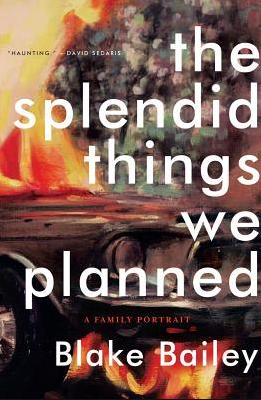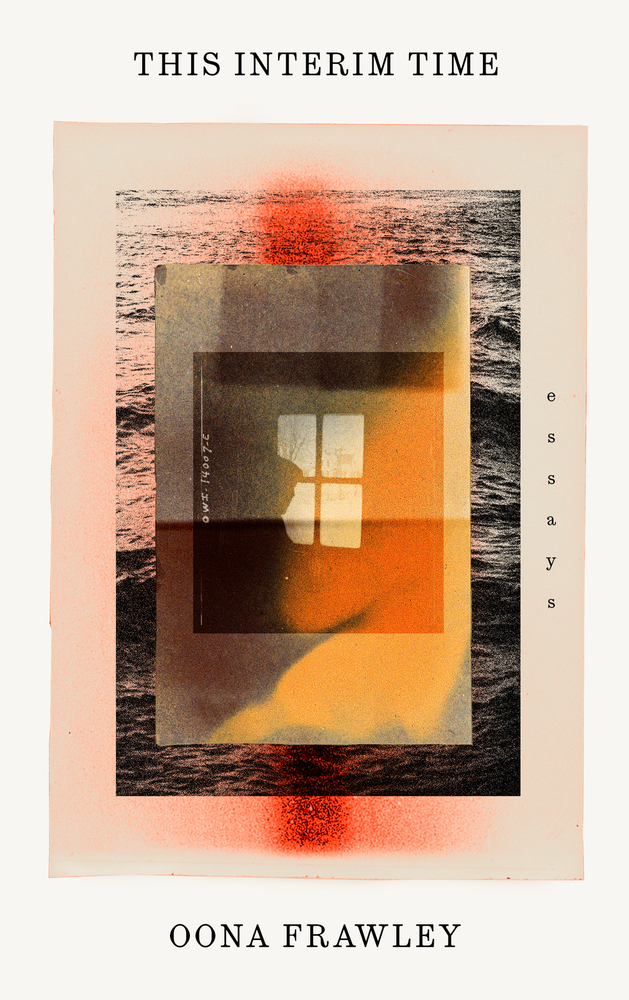Book by BLAKE BAILEY
Reviewed by

Reading Blake Bailey’s memoir of his deranged brother, The Splendid Things We Planned, I kept thinking of a line from the epigraph Bailey quotes from Joe Gould’s Secret, Joseph Mitchell’s portrait of another troubled soul: “You can hate a person with all your heart and soul and still long for that person.” Bailey is the author of acclaimed literary biographies of John Cheever, Richard Yates, and Charles Jackson, all of whom wrote about the desperation behind mid-century American prosperity. This memoir shows that Bailey knows that terrain from personal experience. He opens with a heart-stopping scene of his young parents standing on the roof of a building at New York University in the early 1960s, holding their colicky, howling infant and trying to decide whether to jump together or toss the baby. This turns out to be one of those half-true jokes parents tell on themselves, normally, once their children are thriving. This child never thrived, and Bailey’s family would spend the rest of this child’s life pushed to the edge by his behavior.
The baby on the roof was Blake Bailey’s older brother, Scott; he was the second-born, but Scott’s increasingly destructive behavior defined his childhood. Many of us who came of age in the 1970s knew someone like Scott—handsome, the first to drop acid, do shots, the one who dove naked at 3 a.m. into the quarry, where if you didn’t clear the rocks… Some of those wild boys channeled their daring into boldly successful lives. Scott Bailey never fully matriculated into adulthood, though he lived to fifty-three. The episodes that marked his life make for dramatic reading and occasional humor. By the time Scott was sixteen, Bailey writes, “Life with my family was becoming a serious bummer for all concerned.” This kind of understatement lends charm to an unremittingly grim family portrait.
There was a lot of peer pressure in the sixties and seventies—to keep your cool, handle your drugs, handle your liquor, handle your own mind. This was (and is) easier for some people than others. Scott Bailey couldn’t handle it and his parents, like many at the time, had their own problems keeping themselves and the family intact as the values of the fifties fell by the wayside.
Any memoir has to have resonance beyond the personal. Writers of fiction can alter their source material at will to make it more interesting. Jackson, Cheever, and Yates—whose personal lives were deeply intertwined with the perils and pleasures of alcohol, their generation’s drug of choice, used fiction to capture the decadence and quiet desperation of that era. Though this memoir is clearly intended to be a portrait of an era as well, it comes across mostly as the story of one seriously disturbed individual. It’s apparent from the story that the chaos of the era—including the cant about freedom and the sane being the truly crazy ones—made it hard for Bailey’s parents to come to terms with the fact that their son was seriously ill. But Bailey never really explores this in depth.
Another weakness of the book is the author’s difficulty giving his own youthful troubles their place alongside a brother so volatile that his mother eventually bought a gun to protect herself from his beatings, though she never gave up on him.
Perhaps if Bailey’s métier were fiction, he might have felt freer to write the scenes between himself, his mother, and Scott. Despite the terrible facts of the case, these scenes are flatly written and insights only partly explored. In one scene, Bailey recalls his then-teenage brother forcing him to jump from the roof of their house into the swimming pool below. “Oddly enough, the more abusive he became, the more I wanted his approval.” This analysis does not really illuminate the character of the narrator, and its emotional reserve undermines the scene.
The cultural resonance that’s lacking in Bailey’s descriptions of his own childhood comes out in his portrait of his German-born mother, Marlies, who was transplanted to Norman, Oklahoma from Greenwich Village as a young wife because of her husband’s law career. Marlies is a wonderful character. When the boys are young, she creates a Bohemian lifestyle for herself in this small college town complete with a Moroccan-style den. “Enamored of all things Arabian, she mostly hung out with Arabic exchange students, who embraced the Afros, bell-bottoms, and chest-hair jewelry of seventies America.” Her husband is tolerant to a point (they later divorce), and this life has all the trappings of the era. Bailey and his brother knew about the parties, but “to my mother’s credit, the drugs were stashed and the zippers zipped in time for my return from school, and everyone would leave for the Free Spirit disco a few hours later.”
One of the tragedies of this story is Marlies’ denial of Scott’s inability to control himself and the building evidence of a serious mental imbalance in her eldest son. Marlie’s story is secondary to Scott’s, a shame, because it’s easier to empathize with this edgy, funny woman than either of her sons. After arriving in New York in the late Fifties at the age of nineteen, she “worked at the gourmet shop at Altman’s and got plenty of dates; her English was excellent, she was wistfully intellectual, and she liked to argue in favor of atheism and Ayn Rand.” One can easily re-imagine this story as a novel from Marlies’ point of view.
Scott, on the other hand, is operatic and repugnant. He bullies Blake relentlessly. Roof stunts seem to have been an obsession. Scott climbs up to the roof (the same one he told Blake to jump from) and orders his younger brother to watch as he takes a shit off the chimney:
Afterward he scrambled down and confronted me. “What’d it look like, Zwieb?” he said, a little out of breath.
“What do you mean?”
“Whaddyoo mean? . . . I mean—you stupid little shit—what does my asshole look like when the stuff’s coming out.”
I just stared at him. If I said anything he’d only mock me, and I’m not sure I really understood the question.
Nor does the reader. Why does Bailey watch? Presumably because his brother would retaliate, and the parents don’t intercede. This bizarre incident serves mainly as evidence of Scott’s disturbance and the family’s helplessness in the face of it.
Aside from a period in the Marines, which later allows him medical treatment at the VA hospital, Scott ricochets through his adult life crashing cars, addicted to crack, religion, and violence; for a short time, he prostitutes himself in exchange for drug money. You read this with grim fascination, but the author remains a cipher despite confessing to his own, more average dysfunction. Blake drinks too much with his college fraternity, a problem immediately dispelled when he meets the right woman some years later, and marries her. Ostensibly the “good son,” he and his brother stage drunken homecomings in front of his father’s second wife, Sandra, as her younger children quietly do their homework in the living room. Yet he seems to nurture a childish resentment for her coldness. One Christmas, Blake arrives for a family vacation sporting a black eye from a bar fight. At the airport, he writes, “…Sandra’s face…seemed pinched with such loathing—before flashing back to a tired smile—that I wondered if I’d hallucinated it. Her children were already heading off to Baggage Claim. It was no hallucination.” Eventually, he works through his rage and resentment, and seems essentially sane.
While we sympathize with Sandra, we miss Scott’s extremity when it is off the page. We’d rather have dinner with Blake, even with a shiner and a bad attitude, but he is not the one that you would write a memoir about. The real problem is that, as recounted by Bailey, Scott’s story never rises above a crazy brother yarn.
One wonders if Blake is still afraid to put himself above his brother. Bailey’s instinct to eschew melodrama and let the facts speak for themselves is exactly right, but he may be allowing his desire to protect his damaged family get in the way of the ruthless self-scrutiny required when turning life into memoir.
At times, Bailey captures the emotional intensity of their relationship. After his brother beats him up badly in a parking lot (for no discernable reason), Blake drives him home, “Inside the car, my brother gathered his breath with a long sizzling hiss and held it, grimacing, then all at once doubled over sobbing. I drove. I couldn’t bear it. Even now I can’t bear it—the immensity of those minutes.”
The story may still be too hard for Bailey to tell.
Rebecca Chace is the author of: Leaving Rock Harbor (novel); Capture the Flag (novel); Chautauqua Summer (memoir).



